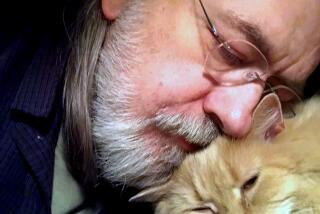Oddball stew, well done
- Share via
BETWEEN the covers of T. Coraghessan Boyle’s new collection of stories is a seething world of comedy, melancholy and obsessive behavior. Many of his tales start with characters in extreme states. Drunk, drugged, snowbound, lovesick, sleepless or gazing into the maw of eternity, they are bruised and scuffed up. But, like the narrator of “All the Wrecks I’ve Crawled Out Of,” eager to tell a story “replete with flames, blood, crushed metal and broken hearts, a whole swath of destruction and self-immolation, my own personal skid marks etched into the road of my life and maybe yours.”
“Tooth and Claw” is an impressive miscellany of styles, genres, voices and subjects. Because most of the 14 stories are written in the first person, it occasionally strains credulity that the narrators could be such polished and perceptive chroniclers of their experiences. The alcoholics and addicts in particular seem to possess a curious lack of control over everything except their anecdotes. Yet Boyle manages to overcome this obstacle to authenticity with the vividness of his writing and the distinctiveness of each character’s diction. Wiseacres, tall-tale tellers, historical raconteurs, bewildered street people -- everybody speaks his or her piece.
The narrator of the title story lays down a bet with a stranger in a bar and walks away the winner -- or is he the loser? -- of a 35-pound African serval, a snarling wildcat. The good news: The exotic feline attracts the attention of a waitress named Daria, who comes home with him. The bad news: The serval tears his bedroom apart, and Daria breaks his heart.
In “The Kind Assassin,” the narrator is an insomniac disc jockey who’s fed up with his career at KFUN and decides to stay on the air for 12 days without sleep. For the station, his ordeal constitutes a ratings bonanza, but for him, it’s a journey to the end of night, a soul-harrowing, brain-hollowing, hallucinatory adventure that he hopes will cure him. The question is, cure him of what? He is unsure of exactly what ails him, and he doesn’t know what wellness might look like, unless it’s the loony female fan Hezza who shares his sleepless suffering. In the end, he resembles Franz Kafka’s “Hunger Artist,” a man whose public display of suffering becomes pointless when he begins to let self-denial define him and loses all interest in relief.
Despite its surface zaniness, “The Kind Assassin” in a sense exemplifies a serious theme that runs through Boyle’s stories. His characters appear to hover between the urge to wake up and the temptation to sleep, between a yearning to live more fully and a countervailing impulse to give up. To complicate matters, they remain uncertain which one they are doing at any given time. Quite often, Boyle’s people seem to believe they are coming alive even as they deaden themselves with drink or dope. At other times, the numbing process seems to be a holding action, a necessary prelude, like hibernation in an animal, that might ultimately lead to rebirth.
As the narrator of “When I Woke Up This Morning, Everything I Had Was Gone” puts it, life “is a struggle against weakness, fought not in the brain or in the will but in the cells, in the enzymes, in the key the DNA inserts into the tumbler of our personalities.” Unfortunately, this sometimes results in an unconvincing link between personal and global forces. In “Blinded by the Light,” for example, the disappearance of the ozone layer in the Southern Hemisphere overwhelms an otherwise slight whimsical tale about a scientific bore who violates the hospitality of several estancia owners. Then in “Chicxulub,” a deeply affecting story -- about a beloved daughter, a late-night emergency and a trip to the morgue -- is somewhat undermined by a series of disquisitions about the random menace of meteors.
At his best, as in “Rastrow’s Island,” Boyle succeeds in creating a world where scientific determinism plays a part, but the characters go on living as if they had a choice and a chance. That he makes their predicament not just compelling but often exuberantly amusing is a tribute to his talent and proof of John Cheever’s claim that good prose can cure anything, including the common cold. *
More to Read
Sign up for our Book Club newsletter
Get the latest news, events and more from the Los Angeles Times Book Club, and help us get L.A. reading and talking.
You may occasionally receive promotional content from the Los Angeles Times.









